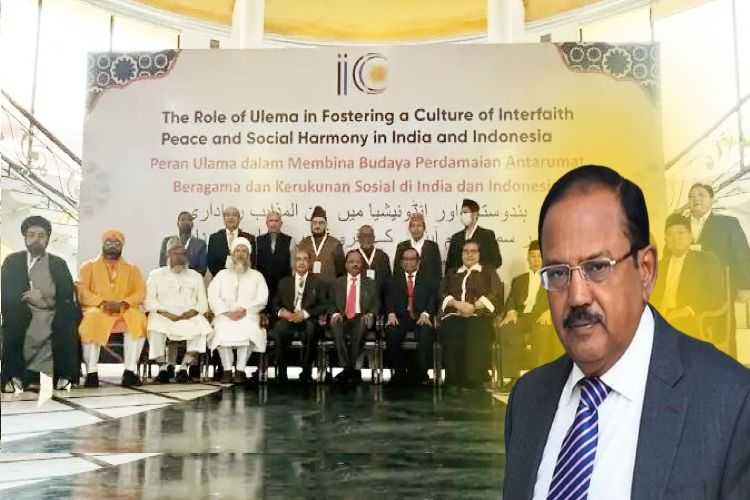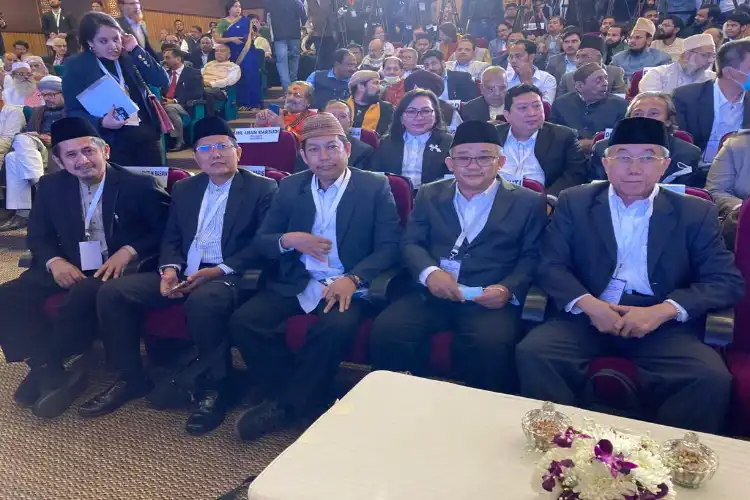
Dr. Hafeezur Rahman
It was probably, for the first time in the history of modern India that an intergovernmental conference was held to highlight the role of Ulema in fostering a culture of interfaith peace and social harmony in India and Indonesia. This epoch-making dialogue was organized by Delhi's India Islamic Cultural Centre on November 29.
The dialogue was inaugurated by India's National Security Advisor, Ajit Doval who delivered an erudite address on the theme. An equally impassioned keynote address was presented by his counterpart Prof Dr. Mohammed Mahfud MD, Coordinating Minister for Political, Legal, and Security Affairs of Indonesia. The expectation was that the dialogue would percolate to the community.
Notably, religious leaders and representatives of many influential faith-based organizations from both nations greatly contributed to the day-long brainstorming sessions moderated by India's well-known IAS officer Shah Faesal while the welcome remarks were given by Sirajuddin Qureshi, President IICC.
Ajit Doval opened the dialogue with the following significant and statesmanlike remarks:
IAS officer Shah Faesal moderating a session in Ulema conference
"(Indian) Ulema have a leading role in educating the people on the original tolerant and moderate principles of Islam and countering extremism with progressive ideas and thought...We need to work together to develop common narratives on de-radicalization."
This was strongly endorsed and reinforced by Dr Mahfud who dwelt upon the pluralistic culture in Indonesia. “Its people are bound by the State ideology Pancasila, which is the five basic principles of the State of the Republic of Indonesia, namely, Believe in God, Humanity, Unity, Democracy, and Social Justice," he said.
More than a dozen delegates from both countries emphasized the pluralistic philosophy of Islam as a catalyst for the promotion of peace and interfaith harmony. They cited several historical examples including the Medina Covenant, Qur'anic verses, and established traditions (hadith) of Prophet Mohammed (peace be upon him) and his life and authentic teachings (Sirah).
The main thrust of this historic summit was that Ulema, faith leaders, and academicians from the two countries must form a global consensus on these serious issues: (1) A joint initiative by Indian and Indonesian ulema should be taken against radicalism and terrorism. (2) Extremist ideologies should be curbed by all schools of thought. (3) A modern curriculum for madrassas and Islamic institutes should be formulated. (5) Scientific temperament, Humanities, and Social Studies should be incorporated into the curricula.
Participants also admired the significant role of ulema in both nations for restoring peaceful co-existence and harmony irrespective of faith and belief. They stressed that Ulema can guide society in a better way by being close to the people and they are followed by the vast majority of Muslims today both in India and Indonesia.
It is a historical fact that the Indian ulema played a pivotal role in our national freedom struggle right from its beginning. Ulema sacrificed their lives fighting the British who hung their bodies from trees.
1857 marked the historical year when the supreme Islamic scholar of his time, Allam Fazle Haque Khairabadi issued a fatwa of Jihad against the Britishers and initiated the Indian mutiny.
It was the first and foremost fatwa issued by a renowned cleric who was also an advisor of Bahadur Shah Zafar and a close friend of Mirza Ghalib. He also brought a few suggestions before king Bahadur Shah Zafar to strengthen the freedom struggle.
The two most important points were mentioned. First, increase the financial assistance to freedom fighters and the army which had limited resources and a shortage of weapons in front of Britishers. Second, a complete ban on Cow Sacrifice in the state as Baqr Eid (the Eid of sacrifices) was approaching. Thus, the Ulema asked Muslims not to slaughter Cows because Hindus worship them as the animal is sacred to them.

Indonesian delegates at Delhi Conference
Significantly, Allama Fazl-e-Haque Khairabadi and Bahadur Shah Zafar along with many Ulema were trying to maintain social harmony during the freedom struggle to weaken the British colonialists’ Divide and Rule policy. At the same time, they issued the historic fatwa of Jihad for the country. Notably, before his anti-British Fatwa, Allama Fazl e Haq Khairabadi also issued a fatwa against the Wahabi sect believers Shah Ismael Dehlavi and Syed Ahmad Raibarelvi, as they were the foremost followers and supporters of the Wahhabi sect in Indian Sub-Continent after Mohammed Ibne Abdul Wahab Najdi, the founder of Wahhabi Islam in Saudia Arabia. Later, Maulana Abul Kalam also followed the Wahhabi strain for some time, but then he became an independent thinker without association with any sect, while his father was a true follower of Hanafi Sunni-Sufi Islam and a student of Allama Fazl e Haq Khairabadi.
More to this point, many other Sufi Sunni-Sufi and Hanafi Ulema valiantly participated in the First Freedom struggle of India during the 1857 revolt against the British. To name a few, Maulana Abdul Qadir Badauni, Mufti Sadruddin Azurdah Dehlavi, Maulana Ahmadullah Shah Madrasi, Maulana Kifayat Ali Kaafi, Maulana Abdul Bari Farangi Mahali and later after Mahatama Gandhi's arrival Ali brothers Maulana Mohammed Ali Jauhar and Maulana Shaukat Ali Gauhar, Maulana Hasrat Mohani, etc. played a key role in Khilafat Movement and freedom movement both with their outstanding oratory and organizing skills.
Ulema did not only sacrifice their lives in their struggle for freedom. But rather, they played a crucial role during the partition and afterward to maintain social harmony in the country. Maulana Abul Kalam Azad, Maulana Husain Ahmad Madani, and all other leading Ulema of Sufi, Shia, Sunni, Deobandi, and Barelvi schools remarkably played a significant role in their respective areas, being in close contact with the society, people and government.
Today, much like the Ulema of the 1857 revolution, the Indian Ulema should be serious about stemming the tide of extremism in any form. They would have to do something more than engage in dialogue with other Ulema and religious heads of other religions. A global and collective denouncement of terrorist and extremist ideologies should be made and declared by the global alliance of Ulema in both India and Indonesia. This declaration should be circulated among Muslims of the two countries so that Muslims of any sect may not be associated with extremist religious organizations.
ALSO READ: Bangladesh genocide: Why Pakistan is not held accountable?
NSA Ajit Doval’s initiative of this interfaith dialogue becomes thus a key landmark on our journey toward a tolerant and peaceful interpretation and understanding of Islam.
(Dr. Hafeezul Rahman is an author, Islamic Scholar, TV host, and the founder of the Sufi Peace Foundation. He can be emailed at [email protected])
